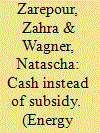|
|
|
Sort Order |
|
|
|
Items / Page
|
|
|
|
|
|
|
| Srl | Item |
| 1 |
ID:
186450


|
|
|
|
|
| Summary/Abstract |
The 2010 energy subsidy reform in Iran is a unique case of redistributive policy as the savings from the subsidy cut have been redirected to households as unconditional, universal cash transfer. While theoretically, the cash transfer was large enough to keep the utility of the average household at the initial level, this study explores the practical impacts of the reform. We analyze panel data on income/expenditure of Iranian households for the period 2010–2012. Since this is a universal reform, we exploit the time dimension and the intensity of energy consumption in the identification and assess the robustness of the results with sub-sample and placebo analyses. Overall, the energy subsidy reform caused a significant shrinkage (7%–9%) in households' real consumption. The cash transfer failed to fully compensate the negative impact of the subsidy removal. The impact is heterogeneous, varying along the intensity of energy consumption, geographical location, income and the share of the cash transfer in a household's income. A non-negligible policy accomplishment of the reform is that within its first two years poverty was mitigated in absolute and relative terms and income inequality slightly improved. Nevertheless, the government is under pressure because inflation counteracts these gains.
|
|
|
|
|
|
|
|
|
|
|
|
|
|
|
|
| 2 |
ID:
136970


|
|
|
|
|
| Summary/Abstract |
The dependence on oil, gas, and mineral exports arguably has a negative impact on economic growth in resource-rich, developing countries. This article looks at the impact of resource dependence on adjusted net savings (ANS) as an indicator of weak sustainability. Our results, based on a panel of 104 developing countries during the recent commodity price boom, confirm a negative relationship between resource extraction and sustainable development as measured by ANS. We further look at the specific role of armed conflict and armed violence as captured by the homicide rate. Armed conflict, which is positively associated with resource dependence, negatively affects ANS per capita according to both our OLS and instrumental variables (IV) estimates. Similarly, armed violence has a detrimental effect on sustainable development. Our IV estimate suggests that a one-point increase in the homicide rate decreases ANS per capita by $60. Since education expenditures are a critical ANS component, we further examine the impact of resource dependence and violence on human capital. Consistent with previous findings, resource-dependent countries underinvest in education but armed conflict and violence do not affect the instantaneous share of education expenditures, hinting at a detrimental effect working through physical and social capital rather than education.
|
|
|
|
|
|
|
|
|
|
|
|
|
|
|
|
|
|
|
|
|